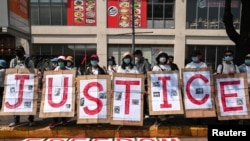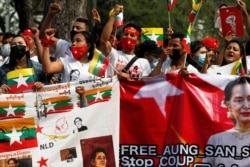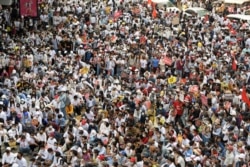Half of Myanmar Press Council’s members resigned last week, saying they are unable to protect press freedom, uphold media ethics, or protect the safety of fellow journalists.
The 15 resignations on the press council come in response to directives issued by Myanmar’s military to news outlets on how they should cover the coup, and concern over legal and physical threats to journalists. The press council is an independent body set up to handle press disputes and ethics queries.
The resignations are in response to letters the Ministry of Information sent to media outlets, ordering them to not use terms including “regime” or “coup,” Myint Kyaw, who was secretary of the Myanmar Press Council until resigning, told VOA Burmese.
The former secretary said that changes to the penal code, including legislation on sedition and “speech likely to cause fear or alarm in the public” would allow the military to bring charges against protesters, activists and other critics, and a draft cybercrime legislation would further increase the risk of journalists being targeted for their work.
“I believe this is only the beginning,” Myint Kyaw said. “I bet the next target will be media. They can arrest and imprison journalists with any fabricated charges.”
Myint Kyaw added that five journalists had been detained while covering mass protests. Thousands of citizens have joined demonstrations across Myanmar after the military overthrew the elected government and detained key opposition members including de facto leader Aung San Suu Kyi.
“More and more such cases arise, and I realized [the press council] simply cannot promote media freedom and is unable to guarantee safety of the fellow journalists,” Myint Kyaw said.
The Myanmar Press Council last week had condemned the draft cyber bill that would give the military access to user data and the power to block websites and jail critics. In its statement, the press council called the law unconstitutional and said it would obstruct journalists’ ability to report.
At a news conference on Wednesday, Brigadier General Zaw Min Tun, the deputy information minister, said he couldn’t guarantee that journalists would not be arrested but said the military will act according to the law. He denied the military was attempting to threaten or intimidate the media and said it would be better if the press upheld ethics.
Publication suspended
The privately owned English-language Myanmar Times announced Sunday that it was suspending operations for three months. The announcement follows a walkout of more than a dozen editors and reporters over what they said were attempts to interfere in their work.
At least 15 journalists resigned after management ordered a reporter to attend a military news conference, which the newsroom had decided to boycott, and because managers had asked the newsroom to limit reporting on opposition to the military coup and to avoid terms such as “coup” and “leader of the military” instead using “transfer of power” and “chair of the State Administrative Council.”
VOA attempted to reach Myanmar Times for comment but its calls went unanswered.
The paper’s chief operating officer has denied management was censoring its journalists, telling the news outlet The Irrawaddy, “We just asked them to comply with the instructions of Ministry of Information and to be neutral.”
Risk of arrest
Several journalists have also reported being harassed or beaten by police and security while covering protests over the coup. At least five were detained while covering demonstrations in the city of Myitkyina.
The Vienna-based International Press Institute said the journalists were released after signing a document agreeing not to violate a curfew banning gatherings of more than four people.
“We are extremely concerned that journalists will be increasingly targeted as Myanmar’s military cracks down on the protests against its destructive coup,” said Scott Griffen, IPI’s deputy director, in a statement.
Naw Seng, of The Media 74, told VOA Burmese he was released on condition that he doesn’t obstruct security personnel. The reporter said he was warned that reporting via Facebook could instigate resentment and protests.
The military has complained that Facebook Live reports encourage more people to join the protests and trigger more unrest, noted L. Gum Jah, of the Peace-talk Creation Group, an organization that mediates in and encourage peace talks. He said that the military has said it wants journalists to adhere to media ethics and added that the public has a right to protest peacefully.
This report originated in VOA Burmese






